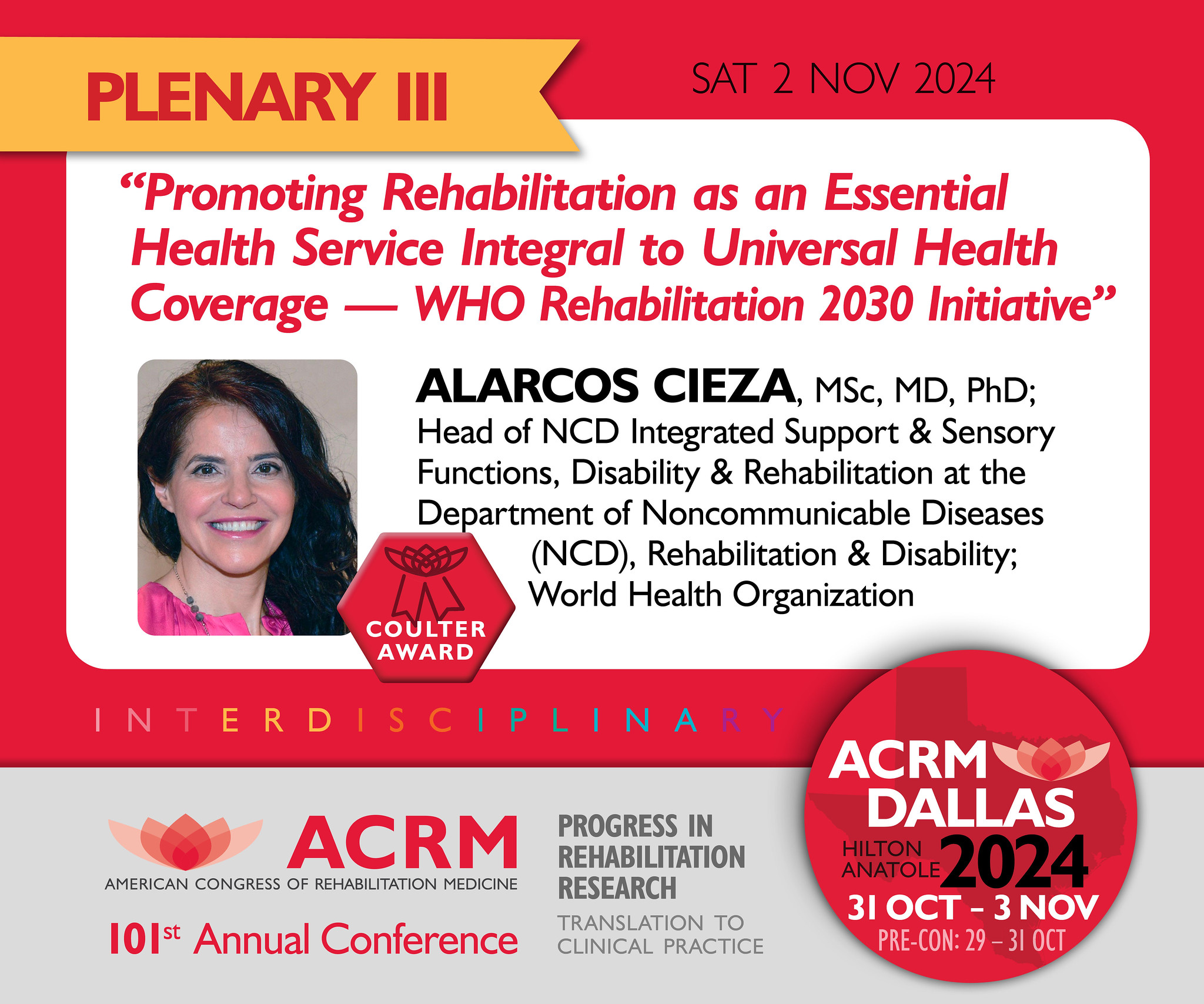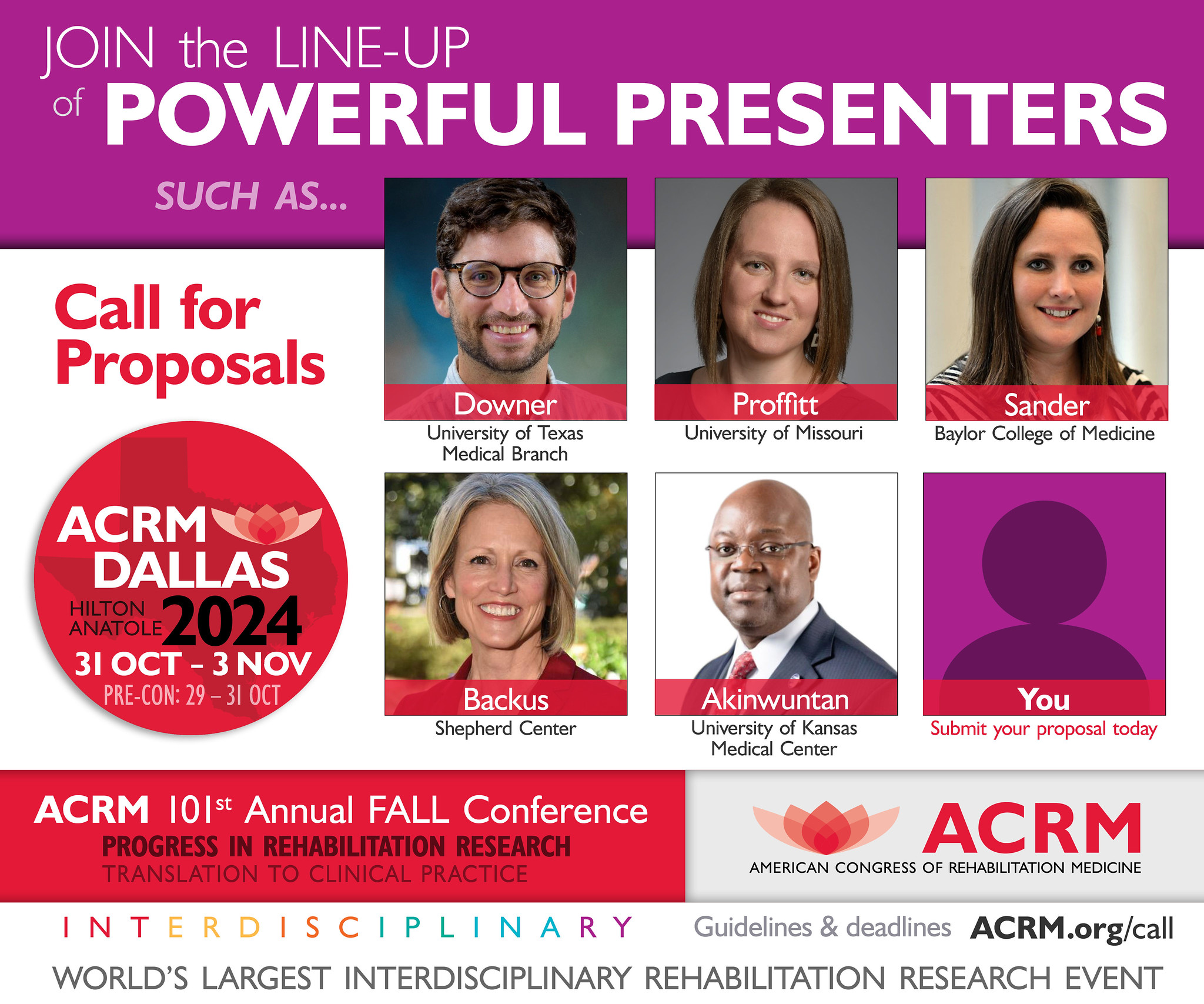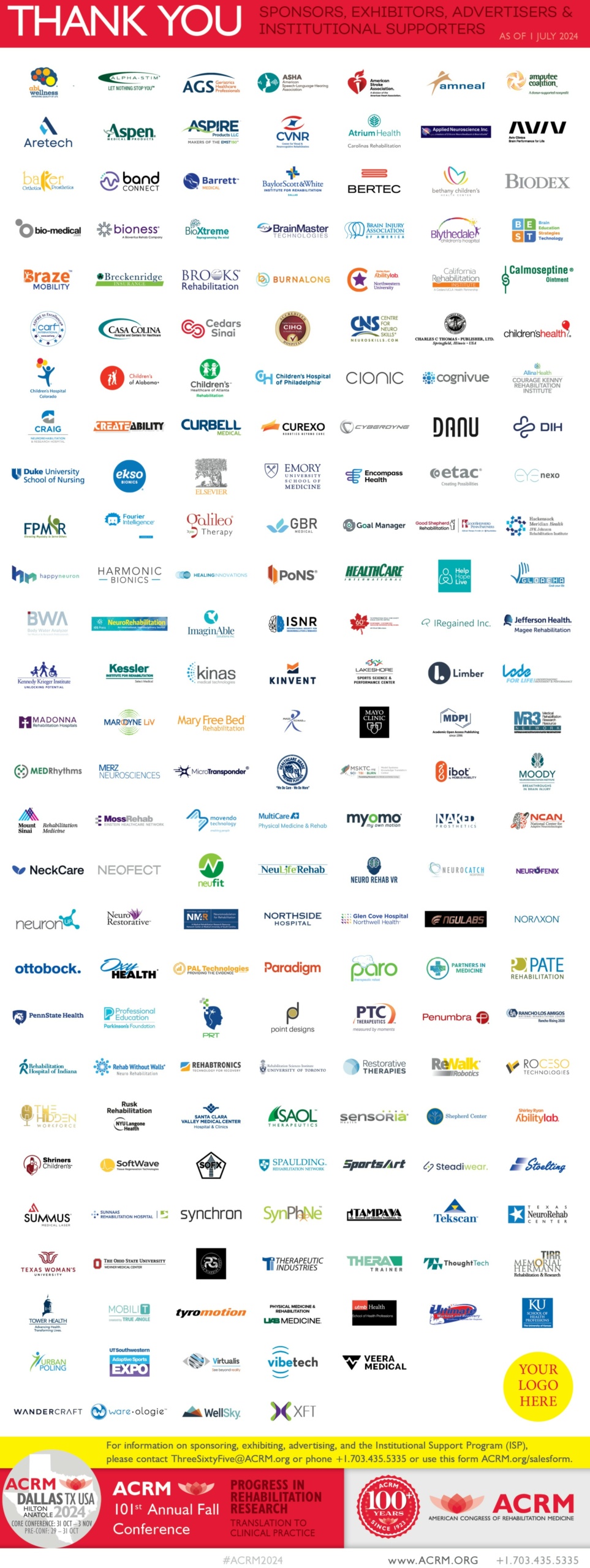2019 Conference Highlights
View Plenaries >>
View Special Symposia >>
View Two-Day Courses >>
View Instructional Courses >>
Join Us In Chicago!
All conference attendees are automatically ACRM members. Non-members receive a 6-month introductory ACRM membership automatically with registration. Put your member benefits to work right away—join an ACRM community group and attend a community group or task force meeting! PLEASE NOTE: Dates and times are subject to change. Please check the Online Program for the most up-to-date information.
Wednesday 6 NOV
7:00 AM – 8:00 AM
- Physicians & Clinicians Networking Group Business Meeting (open for ALL to attend)
Location: 4J, 4th Floor
Plenaries >>
An Around the World Perspective – Moving the Needle on Rehabilitation Medicine and Research >>
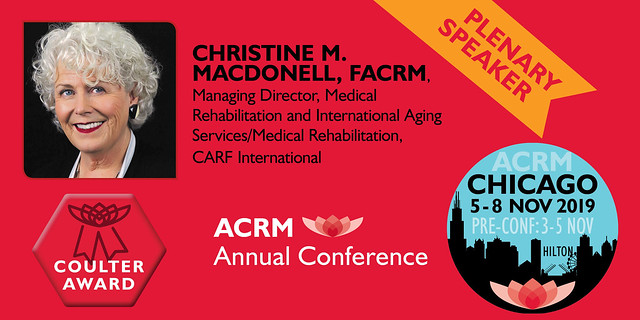
Through an international lens we will explore our awareness of how person centered practices are used to create the meaningful plan to return persons served to a quality of life not just a discharge destination. Billie Jean King once stated: ” I think self awareness is probably the most important thing towards being a champion.” All of the rehabilitation and research community need to examine their self-awareness of the lives of those we serve to become their champions,Through stories of success, failure, and resilience we will become more self aware and make the necessary change to practice.
Learn more >>
Special Symposia >>
What is the Evidence for Neurofeedback for Attention-Deficit/Hyperactivity Disorder? >>
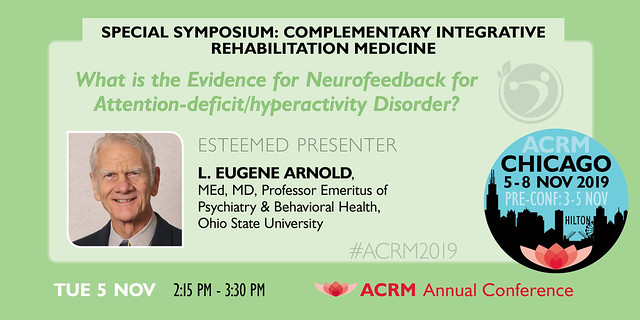
Treatments with long-term benefit for attention-deficit/hyperactivity disorder (ADHD) are needed; one of the more promising is Neurofeedback (EEG Biofeedback), which has several Randomized controlled trials showing significant benefit, but which are inconclusive because they were not Double-Blinded; the benefit could have been nonspecific (placebo response). Because of Neurofeedback’s labor-intensive cost, it is important to know how much specific benefit it yields. This presentation will review and critique the evidence base for neurofeedback (EEG biofeedback (NF) as treatment for ADHD and unveil preliminary results of an NIMH-funded double-blind 2-site randomized clinical trial (RCT) designed to address flaws of previous studies.
Learn more >>
SPECIAL SYMPOSIUM & ASA/ACRM Award for Excellence in Post-Acute Stroke Rehabilitation: Biomarkers in Stroke Recovery and Rehabilitation Research >>
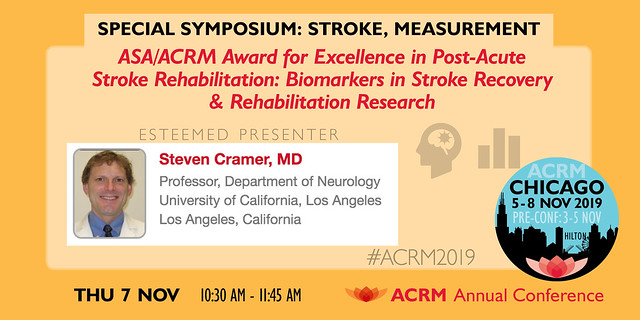
A number of therapies are emerging that aim to promote favorable brain plasticity after stroke, with the goal being to improve outcomes and reduce disability. Treating the brain is not a “one-size-fits-all” process. Instead, certain treatments are more, or less, likely to improve brain function in specific subsets of patients. This presentation will briefly review the range of therapies under study, then focus on measurements that have been evaluated for predicting responders versus non-responders in the context of restorative therapies after stroke, with an emphasis on studies targeting the motor system.
Learn more >>
Cancer Rehabilitation Guideline Development Update >>
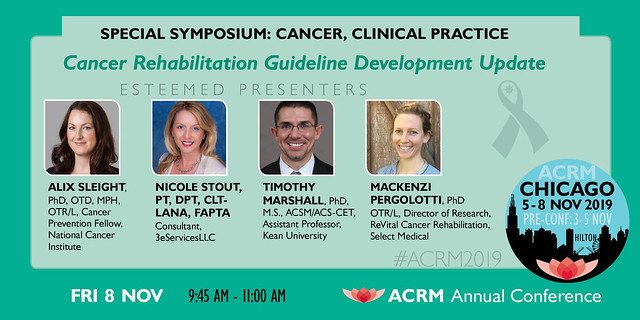
The Cancer Rehabilitation networking group of ACRM will present the results of a systematic review of the literature, a synthesis of evidence for a care delivery model, and scoping review of cancer rehabilitation guidelines. The information provided from these three projects will coalesce to inform the development of a Cancer Rehabilitation Guideline.
Learn more >>
Rehabilitation of Functional Neurological Disorders >>
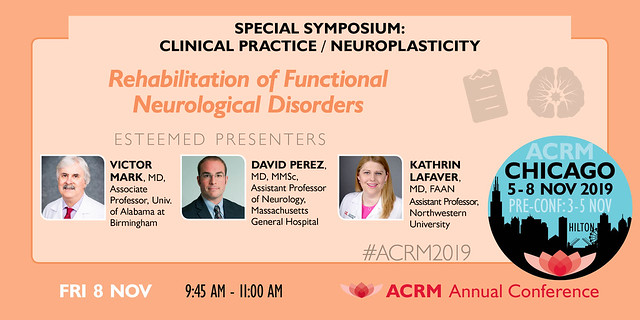
Functional Neurological Disorder (FND) is a common but undertreated and widely misunderstood disabling illness. However, recent research has suggested the combination of Cognitive Behavioral Therapy (CBT) and symptom-oriented physical rehabilitation may be efficacious. This Special Symposium will begin by reviewing the historical background and neuroscientific evidence of disease mechanisms of FND. Next, we will describe the structure of an FND clinic. This will detail the rehabilitation physician’s role for assessing for possible FND, ruling out false-positive diagnoses, and presenting and explaining the diagnosis. Finally, the role of CBT coupled with physical rehabilitation and recent clinical study outcomes will be reviewed.
Learn more >>
Two-Day Courses
International Outcome Measurement Conference (IOMC 2019) >>
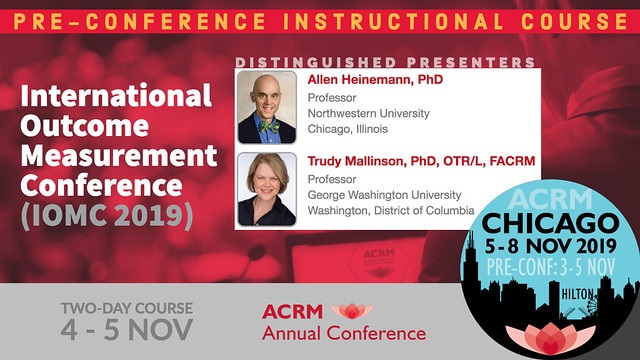
IOMC 2019 is the sixth meeting of the International Outcome Measurement Conference, which has been held 5 times since 1996 and has been an important international event for researchers and health care practitioners who utilize the Rasch Model. Attendance at previous IOMCs has ranged from 50 to 90, from over 12 countries, and 10 rehabilitation/health care disciplines. The goal of IOMC has always been to Promote sound measurement practices in outcome measurement. The conference was founded in 1996 under the sponsorship of Marianjoy Rehabilitation Hospital. Marianjoy also sponsored the second IOMC in 1998. The third IOMC was sponsored by the University of Illinois Chicago in 2001. After a 14-year hiatus, IOMC 2015 was co-sponsored by the Journal of Applied Measurement and MetaMetrics. IOMC 2017 was a joint-effort with the Shirly Ryan AbilityLab and the Journal of Applied Measurement. IOMC 2019 again is a joint-effort with the Shirly Ryan AbilityLab and the Journal of Applied Measurement. Because many members of ACRM MNG also historically attend IOMC, aligning the two conferences maximizes reach and impact of the two organizations.
Learn more >>
Certified Brain Injury Training: The Official Academy Of Certified Brain Injury Specialists (ACBIS) Course // TWO DAY COURSE: SUN-MON >>
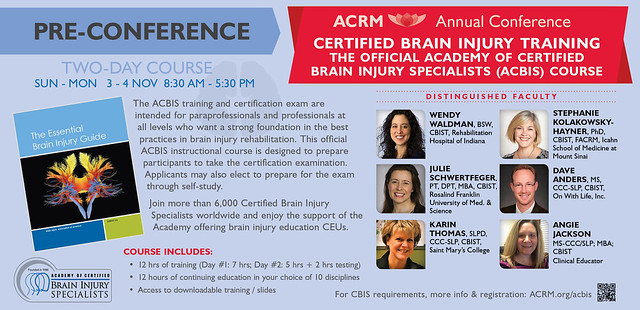
The Brain Injury Association of America (BIAA) offers a national certification program through its Academy for Certification of Brain Injury Specialists (ACBIS). To obtain CBIS certification, candidates must complete the required work experience and training and pass an examination.
This two-day training is the official ACBIS course designed to prepare participants to sit for the CBIS Certification Exam and join more than 6,000 Certified Brain Injury Specialists (CBIS) worldwide. The (optional) exam will be offered at the end of the course on 4 November.
Learn more >>
Instructional Courses >>
IC 31: An Introduction to the NIH Toolbox’s Suite of Neurobehavioral Tests and use in Rehab Settings >>
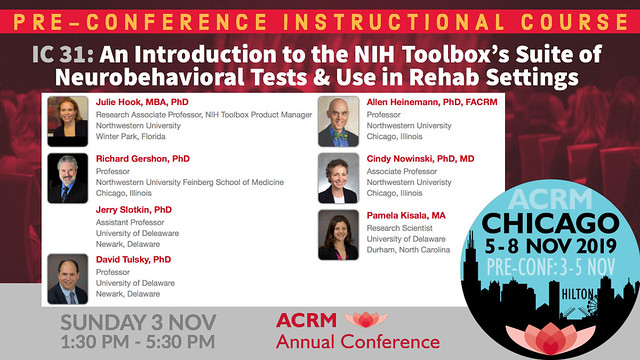
The NIH Toolbox® workshop presents updated research and hands-on demonstration of this cutting edge measurement system to assess neurological and behavioral function. The advantages of employing common measures across rehabilitation research and clinical practice will be addressed. Recent findings with the NIH Toolbox in spinal cord injury, stroke and traumatic brain injury will be described. Participants will acquire the basics of computer adaptive testing and modern psychometric approaches and the building blocks for administration of the NIH Toolbox® measures for emotional, cognitive, sensory and motor function via an iPad.
Learn more >>
IC 13: TBI Expert Witness Boot Camp: What Brain Injury Rehabilitation Professionals Should Know >>
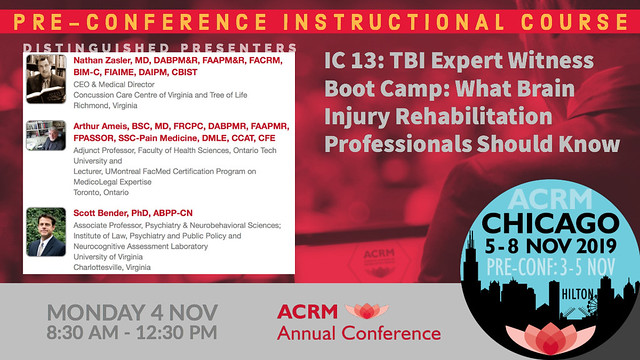
This instructional course will familiarize attendees with various aspects of TBI medicolegal and expert witness work including medicolegal roles (treater, expert witness, peer reviewer, and consultant), ethics, business and legal issues of medicolegal involvement, and medicolegal examination, report and testifying recommendations.
Learn more >>
IC 6: Wheelchairs and Seating: The Evaluation Process with Demonstration and Justification of Recommended Products >>
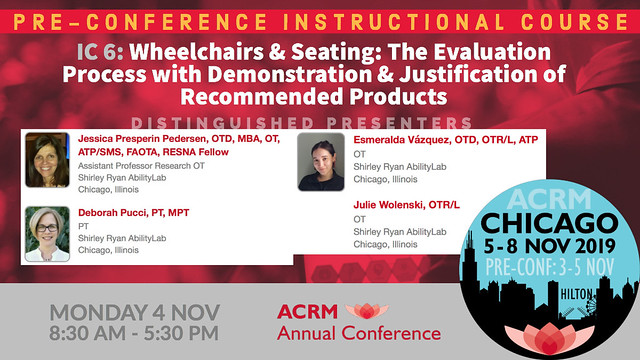
The purchase of a wheelchair and seating products is a critical step for many non-ambulatory individuals. This hands-on course provides evaluation techniques, product demonstration, and funding criteria for individuals of all ages having a variety of neurological or orthopedic diagnoses. It will provide a step-by-step overview beginning with the medical intake and information gathering pertaining to physical and functional parameters for decision making. The mat evaluation and measurements, will be covered. Participants will learn how to perform an evaluation, fill out a detailed form with medical justification of the products, and trial mobility bases, cushions, and supports.
Learn more >>
IC 12: Digging into Motivational Interviewing: A Practical Workshop for Rehabilitation Professionals >>
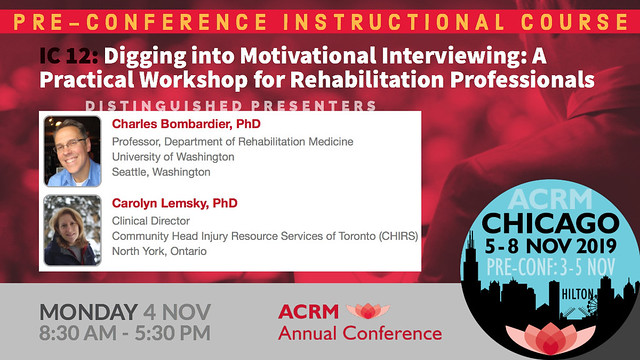
This workshop will focus on understanding, observing, and practicing core Motivational Interviewing skills. As a rehabilitation professional, you may have already had some exposure to MI skills, processes, evidence base as well as how it applies to consultation and intervention. This workshop will provide an opportunity to dig more deeply into how MI really works, sharpen your MI skills, capture MI spirit and become better able to implement MI into your clinical practice. This workshop is suitable for beginners and will cover core skills, but is only for practitioners who know MI is evidence-based.
Learn more >>
IC 15: Get Your Paper Out! A Practical Course to Increase Your Academic Writing Productivity >>

Clinicians and academics need to publish their research findings in peer-reviewed journals but can often struggle with finding the time and the commitment to meet this responsibility. Unfortunately, there are few resources available related to writing productivity to support academic writers. The purpose of this half-day workshop is to demonstrate practical strategies to increase writing productivity. Using a combination of short presentations, discussion sessions, and writing practice, participants will identify and address their barriers to writing productivity, learn practical strategies, and join a community of academic writers in rehabilitation science.
Learn more >>
IC 27: Conceptualization and Application of Patient Reported Outcomes in Clinical and Research Venues >>
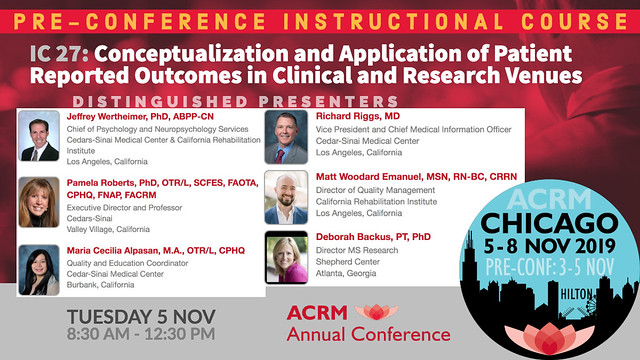
This course will focus on the use of patient reported outcomes (PROs) in clinical and research rehabilitation settings. An introduction to psychometric properties associated with PROs, selection of appropriate PRO measurements, and the significance of the inclusion of PROs in the care of the rehabilitation patient is discussed. Examples are provided to highlight lessons learned in systematizing outcome collection and integration into the electronic health record.
Learn more >>
IC 32: Bench to Bedside: A Guide for Implementing Evidence Based Interventions into Practice at Organizational Level >>
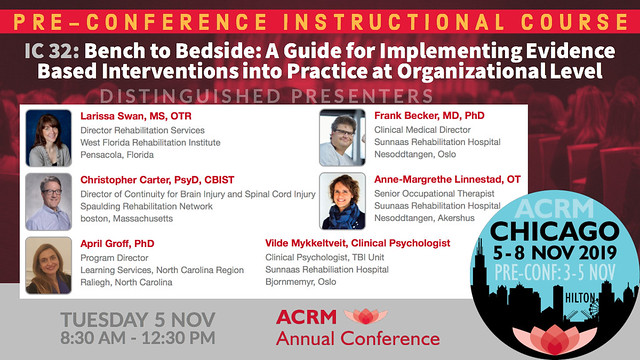
Implementation of evidence based interventions (EBI) has proven to be a challenge in the rehabilitation community. Literature indicates that the integration of EBI into consistent practice can take 17 or more years. Therefore, individuals are not benefitting from interventions evidence has shown will enhance the rehabilitation process. This workshop will provide an overview of Knowledge Implementation theory, the Knowledge-to-Action cycle. Participants will have an opportunity to work in facilitated groups to begin a preliminary analysis of their own organization to develop plans as to how to capitalize on facilitators and overcome barriers to implementing EBI as a practice standards.
Learn more >>
IC 33: Team Care and Interdisciplinary Coordination >>
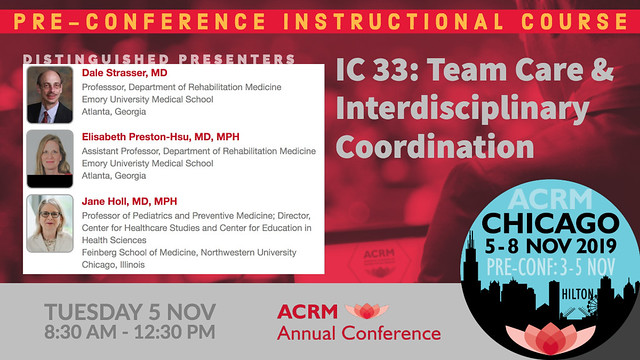
Over the last 25 years a growing body of evidence shows that patient outcomes improve with organizational and process interventions targeting rehabilitation service delivery. This workshop aims to provide participants with the skills and knowledge to address problematic areas in team functioning (TF) and interdisciplinary coordination (IC). Woven into the workshop are relevant concepts derived from organization theory including Tacit Knowledge (TK) and Knowledge in Practice (KIP). Participants will examine how TF and IC impact patient outcomes in a variety of circumstances and develop both diagnostic skills and interventional strategies to optimize team work and staff coordination.
Learn more >>
LEARN MORE | REGISTER | BOOK HOTEL | ONLINE PROGRAM
ACRM 96th Annual Conference | Progress in Rehabilitation Research
CORE: 5 – 8 NOV 2019 // CHICAGO USA // PRE-CONFERENCE: 3 – 5 NOV 2019



